| MARCH 2022 |
| Cancellation of one Kabuki performances in April 2022 due to coronavirus (COVID-19)!!! |
| Kabukiza (T˘ky˘) |  |
| Dates | 3 ~ 28 March 2022 Sangatsu ďkabuki March Grand Kabuki |
| 1st program |
Shin Sangokushi |
| 2nd program | |
| 3rd program | |
| Casting |
Living National Treasure Onoe Kikugor˘, Living National Treasure Kataoka Nizaemon, Living National Treasure Nakamura T˘z˘, Nakamura Shikan, Nakamura Jakuemon, Nakamura Tokiz˘, Nakamura Kaishun, Matsumoto K˘shir˘, Nakamura Ganjir˘, Nakamura Kinnosuke, Ichikawa Sadanji, Ichikawa Ennosuke, Kataoka Takatar˘, Ichikawa Chűsha, Ichikawa Danz˘, Nakamura Karoku, Band˘ Hikosabur˘, Ichikawa Monnosuke, Ichikawa Emisabur˘, Ichikawa Emiya, Ichikawa Komaz˘, Onoe Ukon, Kawarasaki Gonjűr˘, Band˘ Shűch˘, Matsumoto Kingo, Ichikawa En'ya, Nakamura Matsue, Ichikawa Seiko, Nakamura Kash˘, Ichikawa Juen, ďtani Keiz˘, Nakamura Kichinoj˘, Kataoka Matsunosuke, Ichimura Kitsutar˘, Kataoka Sennosuke, Nakamura Takanosuke, ďtani Hirotar˘, Nakamura Fukunosuke, Ichikawa Danko, Terajima Maholo, Ishibashi Sh˘ji, Asano Kazuyuki |
| Comments |
The March Grand Kabuki at the Kabukiza. Ichikawa K˘tar˘ takes the name of Ichikawa Seiko II in the first program.
|
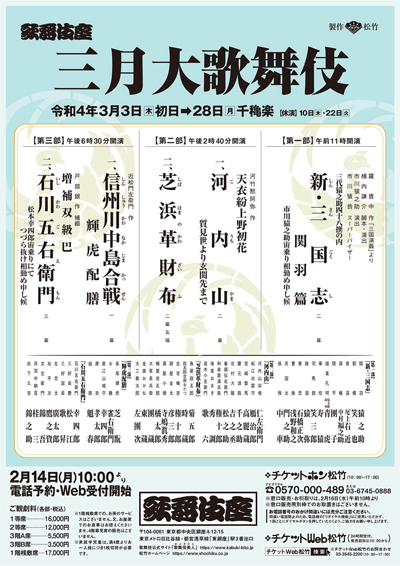 |
| National Theatre (T˘ky˘) |
| Dates | 3 ~ 27 March 2022 |
| Program | |
| Casting |
Onoe Kikunosuke, Nakamura Baishi, Nakamura Matagor˘, Kamimura Kichiya, Kataoka Kamez˘, Nakamura Mantar˘, Nakamura Kangyoku, Nakamura Tanenosuke, Onoe Ushinosuke, Arashi Kitsusabur˘, Ogawa Hiroharu |
| Comments |
The usual March Kabuki performances at the National Theatre.
|
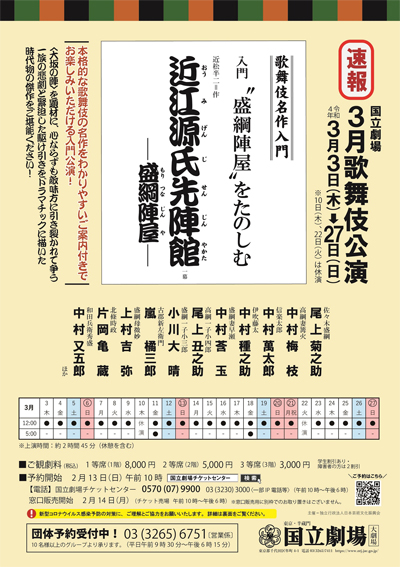 |
|
|
| Dates | 2 ~ 13 March 2022 Sangatsu Hanagata Kabuki March Young Actors Kabuki |
| Program | |
| Casting |
Nakamura Hayato, Band˘ Minosuke, Nakamura Kazutar˘, Nakamura Yonekichi, Nakamura Hashinosuke, Band˘ Kamez˘, Nakamura Utanosuke |
| Comments |
Young actors performing in Ky˘to at the Minamiza. The same program is staged twice a day, at 11 and at 15:30 with a different casting.
|
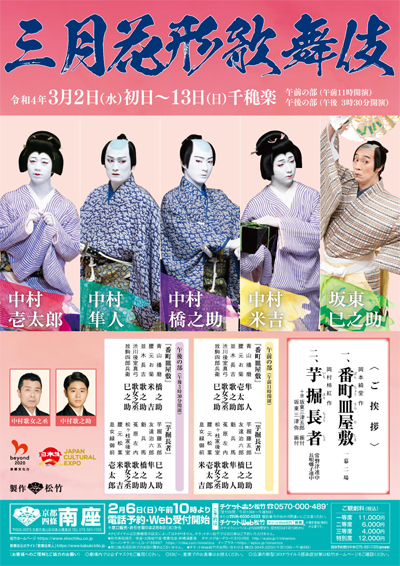 |
| Shungy˘ Special Tour | |
| Dates | 6 ~ 26 March 2022 Shungy˘ Tokubetsu K˘en The Dawn of Spring Special Performances |
| Program |
T˘ku K˘nÔ Sumidagawa Chigusa no Nuregoto |
| Casting |
Nakamura Kankur˘, Nakamura Shichinosuke, Nakamura Tsurumatsu, Nakamura Kosabur˘, Nakamura Ich˘, Sawamura Kunihisa, Nakamura Nakasuke, Nakamura Nakaji |
| Comments |
The 3rd edition of the Spring Tour of the Nakamuraya guild with performances in 16 venues. There is a website dedicated to this tour.
|
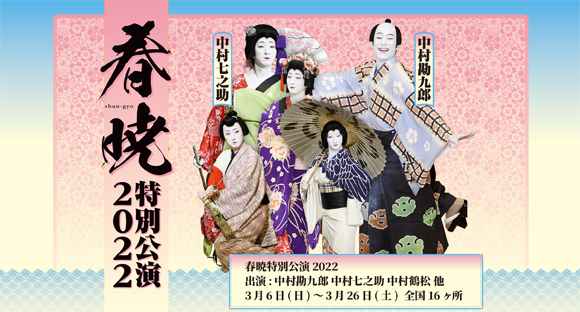 |
| EX THEATER (T˘ky˘) |  |
| Dates | 18 February ~ 6 March 2022 (Roppongi Kabuki) Roppongi Kabuki |
| Program |
Hanazochiru |
| Casting |
Ichikawa Ebiz˘, Ichikawa Udanji, Nakamura Kotar˘, Totsuka Sh˘ta |
| Comments |
Fourth edition of the Roppongi Kabuki performances at the EX THEATER. Based on a script written by Imai Toyoshige, the stage direction is done by the famous movie director Miike Takashi, an expert in violent and bizarre movies who worked twice with Ichikawa Ebiz˘ for the movies "Hara-Kiri: Death of a Samurai" (2011) and "Over your Dead Body" (2014). "Hanazochiru" is based on Kawatake Mokuami's drama "Benten Koz˘" but it has been reformatted in order to fit in a new background reminiscent of the current times and to attract younger audiences. |
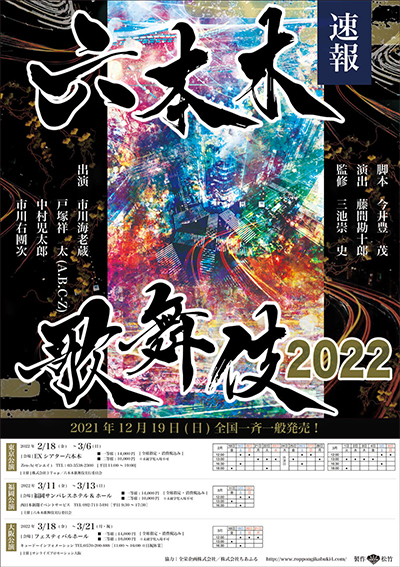 |
| Fukuoka Sunpalace Hotel & Hall (Fukuoka) |  |
| Dates | 11 ~ 13 March 2022 (Roppongi Kabuki) Roppongi Kabuki |
| Program |
Hanazochiru |
| Casting |
Ichikawa Ebiz˘, Ichikawa Udanji, Nakamura Kotar˘, Totsuka Sh˘ta |
| Comments |
Fourth edition of the Roppongi Kabuki performances. Based on a script written by Imai Toyoshige, the stage direction is done by the famous movie director Miike Takashi, an expert in violent and bizarre movies who worked twice with Ichikawa Ebiz˘ for the movies "Hara-Kiri: Death of a Samurai" (2011) and "Over your Dead Body" (2014). "Hanazochiru" is based on Kawatake Mokuami's drama "Benten Koz˘" but it has been reformatted in order to fit in a new background reminiscent of the current times and to attract younger audiences. |
 |
| Festival Hall (ďsaka) |
| Dates | Roppongi Kabuki |
| Program |
Hanazochiru |
| Casting |
Ichikawa Ebiz˘, Ichikawa Udanji, Nakamura Kotar˘, Totsuka Sh˘ta |
| Comments |
[CANCELLED] Fourth edition of the Roppongi Kabuki performances. Based on a script written by Imai Toyoshige, the stage direction is done by the famous movie director Miike Takashi, an expert in violent and bizarre movies who worked twice with Ichikawa Ebiz˘ for the movies "Hara-Kiri: Death of a Samurai" (2011) and "Over your Dead Body" (2014). "Hanazochiru" is based on Kawatake Mokuami's drama "Benten Koz˘" but it has been reformatted in order to fit in a new background reminiscent of the current times and to attract younger audiences. |
 |
| Zenshinza Tour | |
| Dates | 25 March ~ 23 April 2022 |
| Program | |
| Casting |
Arashi Yoshisabur˘, Nakajima K˘tar˘, Watarai Motoyuki |
| Comments |
A March and April dance tour all over Japan for the Zenshinza troupe.
|
|
|
| Contact | Main | Top | Updates | Actors | Plays | Playwrights | Programs | Links | FAQ | Glossary | Chronology | Illustrations | Prints | Characters | Derivatives | Theaters | Coming soon | News |